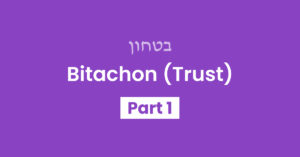In the past 2 weeks, we explained that having Bitachon means believing that Hashem is in control of everything, even what other people do to us. No one can help or harm us unless Hashem wants it to happen.
You might be wondering: If Hashem can do anything, why do I have to work at all? Why can’t I just sit back and relax and let Him run the show? Why bother going to work if Hashem is really the One who gives me money? Why bother eating healthy food and exercising, if ultimately Hashem decides how healthy I will be? Does Hashem really need my help?
Why do I have to work at all?
It’s true that Hashem doesn’t need our help at all. But if He would just give us everything miraculously, with zero effort on our part, it would be too easy for us to have Bitachon. If Hashem would make food and money just fall from the sky, it would be so obvious and easy for us to believe that He is the only One supporting us. But Hashem doesn’t want it to be so easy. Hashem wants us to work hard so that He can test us: Will we believe in the power of our own two hands? Or will we remember that success comes only from Him?
Hashem wants us to work hard so that He can test us: Will we believe in the power of our own two hands?
The Chovos HaLevavos1 tells a story of a sofer (scribe) who earned his money through writing. One day, someone asked the sofer: “How’s your business going?” The sofer answered: “As long as my hand is working, I’m doing well!” That evening, his hand was injured and he could never write again. The Chovos Halevavos says this was his punishment for trusting in his hand rather than trusting in Hashem. The sofer should have realized that his hand was just like a pipeline or messenger through which Hashem sent his parnassah. Our hands have no power of their own.
Today, too, we easily slip into this illusion of believing that we control our own success. The savvy businessman thinks he’s rich and successful because of his keen intelligence, but who gave him brains in the first place? The student thinks she aced her test because she has a great memory, but who gave her that great memory? The singer thinks he is popular because of his beautiful voice, but who gave him that voice?
We each need to put in hishtadlus (effort) to achieve success, but no matter how much effort we put in, we must always remember that our success – and failures! – come only from Hashem.
Just Fulfilling My Obligation
Not only must does Hashem give us the tools for achieving success (such as our brains, hands, memory, good voice, etc.) but we also must remember that the outcome of our efforts is totally in Hashem’s control.
The outcome of our efforts is totally in Hashem’s control.
Imagine a 40-year-old man named Yehuda who is searching desperately for a job to support his family. One day, Yehuda comes across a job opportunity in the newspaper, and sends in his resume. On Tuesday, he goes for an interview. As he is leaving the interview, the interviewer shakes his hand and says: “It was so nice to meet you, Yehuda! You seem like a very talented individual… but to be honest, I don’t think you’ll be a good fit for our company.”
Yehuda exists the office building feeling totally downcast and defeated. He put in so much time and effort into applying for this job and getting the interview… and now – poof! It’s gone! There is nothing to show for his efforts, and he is back to square one.
As Yehuda walks down the street, he bumps into his old friend, Eliezer. “Why are you so upset?” asks Eliezer. “Why the long face?” Yehuda tells Eliezer about his job search and failed interview. “Well, guess what, Yehuda – I have good news for you!” says Eliezer. “I actually just started my own business, and I’m looking for a partner. You’d be a great fit, and I’d love to work with you! Would you be interested in working together?”
Yehuda is shocked and can’t believe what is happening. He thanks Eliezer profusely, asks for more details, and eventually takes the job.
What an unexpected turn of events! And how sad that Yehuda had to go through that uncomfortable interview, when it didn’t even end up getting him the job. Does this mean Yehuda didn’t have to go on that first interview to begin with? It seemed like the interview accomplished nothing in getting Yehuda his job!
Chazal teach us this is not the proper perspective. Yehuda did need to go on that interview, to fulfill his obligation of hishtadlus – an obligation that stretches back all the way to the beginning of Creation, when Hashem told Adam, “B’zei’as Apecha Tochal Lechem – By the sweat of your brow you will eat bread.”2 Every person is required to put in effort to get what he needs. But once we have fulfilled our obligation of hishtadlus, Hashem can send the solution through any route, regardless of whether it’s directly connected to the place where we put in our efforts.
Hashem can send the solution through any route.
Imagine that Hashem has a cup for each person called “The Cup of Hishtadlus.” Whenever we put in effort to achieve what we need, our cup gets filled up. When we have put in enough hishtadlus to be considered a reasonable, responsible amount, then our “Cup of Hishtadlus” is full, and Hashem can now send us what we need. When Yehuda applied for the first job and went on the interview, he was filling up his “Cup of Hishtadlus.” When the cup was full, he was done fulfilling his obligation, and Hashem sent his salvation through a different means – through Eliezer.
The Mesilas Yesharim3 compares hishtadlus to a “tax” we need to pay to Hashem. Once we have invested a reasonable amount of effort into getting what we want, then we have discharged our obligation, and the gates are now open for Hashem to pour down the success or solution we are waiting for.
Understanding that our success depends totally on Hashem is actually a relief, because it means that the success of our efforts is not riding totally on our shoulders.
Understanding that our success depends totally on Hashem is actually a relief, because it means that the success of our efforts is not riding totally on our shoulders.
Since our hishtadlus is just like paying a “tax” to fulfill our obligation, we don’t have to worry too much about impressing people or doing things perfectly. When Yehuda goes for his interview, he doesn’t need to feel excessively nervous or pressured to make a good impression or flatter his interviewer. Likewise, Yehuda doesn’t need to resort to unscrupulous methods to cheat his way into getting the job.
If Yehuda understands that Hashem is running the show, he can confidently put in and honest effort to simply fill up his “Cup of Histhadlus” – and then rest assured that Hashem will take it from there.
Hashem just wants us to put in some degree of responsible effort – do “reasonable” hishtadlus – but the weight of the successful results does not depend totally on us. We just need to do our best, and then rest assured that Hashem will take care of the rest.
Sources: [1] Shaar HaBitachon Chapter 5; [2] Bereishis 3:19; [3] Mesilas Yesharim Chapter 21
Your Challenge
When you do an act of hishtadlus, say something like: “Even though it LOOKS like I am accomplishing this myself, really I am just fulfilling my obligation of hishtadlus, and I know the results are ultimately up to Hashem.”
FOR EXAMPLE:
- I am going to work to fulfill my obligation to TRY to earn money, but ultimately I know that all money comes only from Hashem.
- I am eating this food to fulfill my obligation to TRY to be strong and healthy but ultimately I know that my health depends only on Hashem.
- I am going to meet a shadchan to TRY to find a shidduch, but ultimately I know that Hashem is the One who makes shidduchim.
- I am going to school to TRY to be an educated person who can get a job one day, but ultimately I know that Hashem is the one who gives people jobs.
- I am cooking this food to TRY to provide delicious and healthy food for my family, but ultimately I know that Hashem is the one who makes food taste good.
Torah Questions
- There is someone in the Torah who teaches us that everything we need is right in front of us, we just need Hashem to open our eyes to see it. Who teaches us this? (Bereishis 21:19)
- Rashi (Tehillim 37:3) says that a person who does not have enough Bitachon might do something bad – or avoid doing something good – in order to get more money. What might he do (or not do)?
- What mashal does the Gemara give to explain why Hashem made new Mon (manna) fall every day in the desert, rather than making it all fall once a year? (See Yuma 76a)
- The Gemara (Brachos 60a) says that before a person goes to let blood (a form of healing in the olden days), they should say a special prayer. What does this prayer say?
- What does Tehillim Perek 115 say will happen to someone who trusts in idols?
- Shlomo HaMelech says (Mishlei 3:5): “Rely on Hashem with all your heart, and do not rely on your own _____?”
- Who said to who? “You intended to harm me, but Hashem intended it for good.” (Bereishis 50)
Questions to Ponder
- Can you remember a time in your life when you tried to achieve success through one route, but Hashem sent your success through a different route entirely? (For example: You apply for one job but then get offered a totally different job.)
- We are required to put in “reasonable effort” to acquire whatever we need… but how do you know how hard Hashem wants you to try? How do you know what’s considered “reasonable effort”?
- The Ramban says that Emunah and Bitachon are compared to a tree and its fruits. How is Emunah like a tree, and how is Bitachon like the fruit?
- In Hallel (Tehillim 115) the pesukim mention 3 groups of people who are said to trust in Hashem. Why are these 3 groups singled out?
- If Hashem takes care of every person’s needs, why do we need to give charity? Can’t Hashem just give money to the poor in a different way? Does He really need our help to support them?
- Dovid HaMelech writes in Tehillim (131:2) that he feels like a nursing child upon his mother. Why did Dovid choose that comparison? How does a nursing child represent the epitome of Bitachon?





